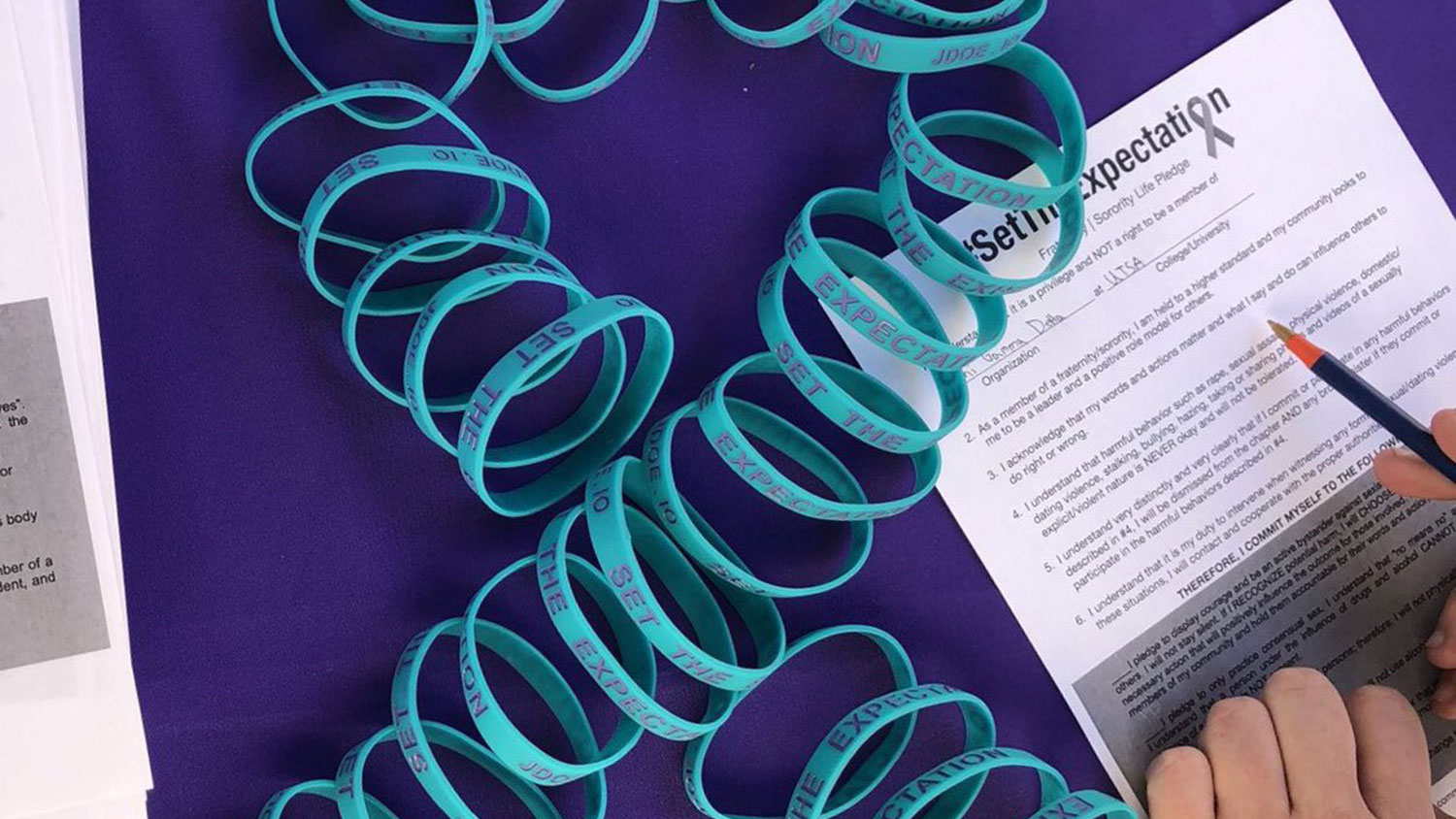On #SetTheExpectation… What Now?

Over the last week, over 500 student athletes, student leaders, faculty and staff heard the words of activist and educator Brenda Tracy.
Tracy told her story of violence and survival and delivered her call to action for student athletes and student leaders to #SetTheExpectation and take a stand against interpersonal violence. After her talk, students received teal wristbands as a reminder to #SetTheExpectation and had the opportunity to sign a pledge to be a leader in words and actions against interpersonal violence.
Her charge is clear. “Make sure that nothing like what happened to me ever happens to anyone again.”
Students left motivated and inspired, yet, many were also left with the lingering question, “How?”
Interpersonal violence (IPV) is the most under-reported crime in the United States, and over 90% of college sexual assaults are not reported. From the reports that are made, we know that during college, at least 1 in 5 women will experience IPV and 1 in 16 men will experience sexual assault. Over 70% of LGBTQIA college students have faced harassment or abuse. Nearly 60% of college students say they don’t know how to help someone who has experienced dating violence. Nationally, only 40% of student athletes believe they can play a role in preventing sexual assault at their school.
Where do we start against these odds?
The impact of hearing Tracy’s story last spring inspired athletes James Smith-Williams and Vinnie Durand to begin mobilizing their community and their platform to join the fight against interpersonal violence and to invite Tracy back to NC State. Others on campus, including the NC State Women’s Center, have been supporting survivors since its inception in 1991, and The Movement Peer Educators have been educating about IPV prevention at NC State for over a decade. Tracy’s return visit last week, and her powerful message reaching hundreds more on campus, has created a unique opportunity for NC State communities to come together in partnership to truly bring about transformational change.
As Tracy shared her story, she reminded us that the work comes in five stages. It is work that requires courage and commitment — and it requires partnership. Here’s what you can do:
- Sign the Pledge — Encourage your athletic team, your fraternity, sorority or student organization to sign the pledge as a commitment to engage in IPV prevention through your actions. Share your commitment publicly so everyone knows what is expected of your community.
- Awareness — Learning about the prevalence of IPV is critical in shattering the stigma and shame that survivors face. Talk to your peers. Learn about resources available on- and off-campus and share these resources when speaking about IPV prevention so all students on campus know how to help and where to go for support.
- Giving Back — Interpersonal violence can have short and long term economic effects on survivors. Organize a fundraiser or donate to the NC State Survivor Fund which provides emergency funding directly to survivors at NC State. The Survivor Fund covers immediate and unforeseen needs that arise as a direct result of experiencing IPV, including medical care, counseling, legal assistance and relocation expenses, to name a few. Survivors can apply for funds at go.ncsu.edu/supportsurvivors.
- Education — Show your commitment to ending IPV by educating yourself and your community. Request a workshop on consent or bystander intervention with The Movement Peer Educators for your team, fraternity, sorority or student group. Join the Women’s Center for a variety of educational programs during the month of October for Domestic Violence Awareness Month. It takes both knowledge and practice to make lasting change.
- Policy Change — Engage in policy change campaigns with #SetTheExpectation or engage on campus or in your local community to make change.
Interpersonal violence prevention is work that each and every one of us can do, but we have to do it together. Will you join us?
** If you or someone you know is experiencing relationship violence, sexual violence or stalking and is in need of advocacy services, the NC State Women’s Center has advocates available from 9:00 a.m. – 5:00 p.m. Monday – Friday in Talley Student Union, Suite 5210. After hours, please call the 24/7 Sexual Assault Helpline at 919.515.4444 to be connected with an advocate. If you’d like to talk to a confidential resource, you can also connect with the NC State Counseling Center at 919.515.2423 or visit 2815 Cates Avenue. For additional resources, see go.ncsu.edu/safe. **
Carlyn Wright-Eakes (she/her/hers) is the IPV prevention education coordinator with NC State Women’s Center and staff advisor of The Movement Peer Educators. Juniper Nie (she/her/hers) is a senior in communication media and graphic communications and director of events for The Movement Peer Educators.
- Categories:


